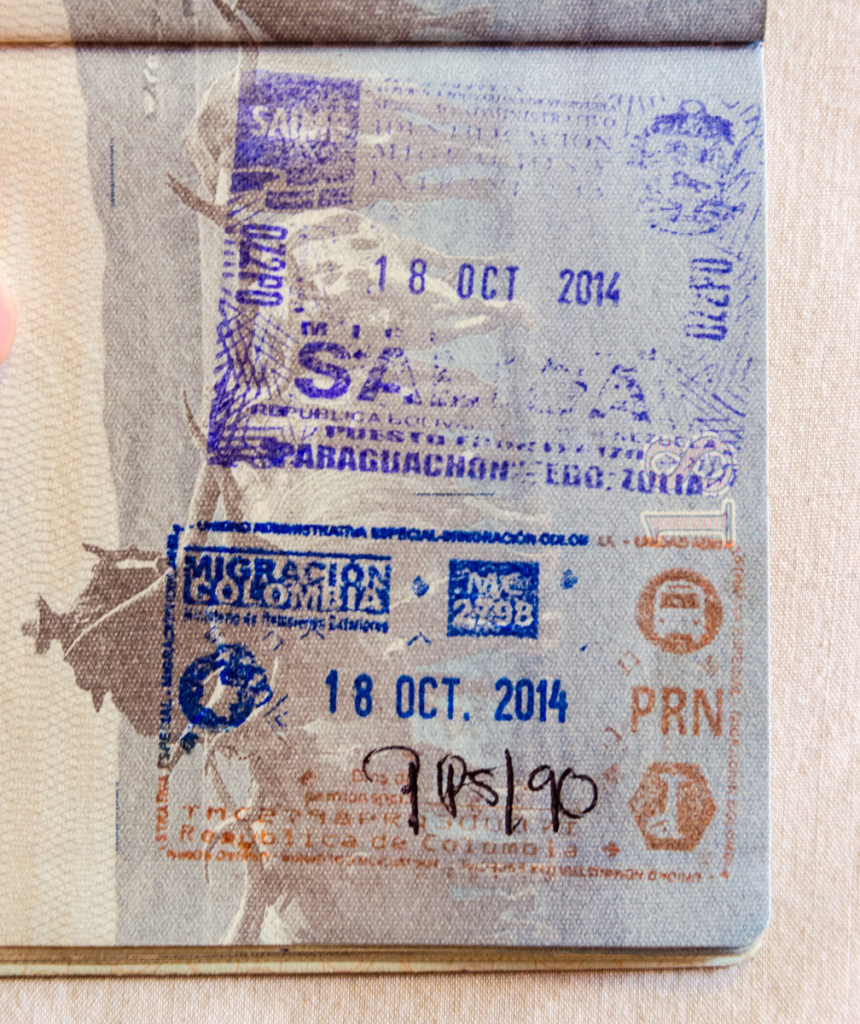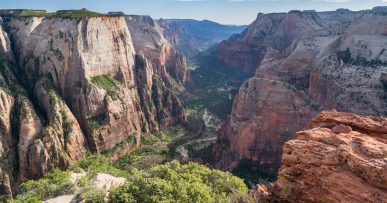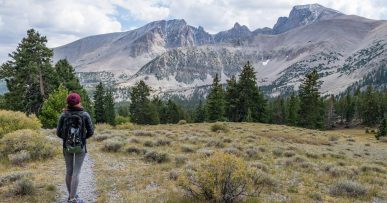- Hike to Mount Roraima – Days 1 to 3
- Hike to Mount Roraima – Days 4 to 6
- Angel Falls – The Place I Wanted to Visit The Most in South America
- Crossing The Venezuela-Colombia Border From Maracaibo to Maicao
- In Review: 18 Days of Backpacking in Venezuela
I felt sick for quite a few days after my trip to Angel Falls. Vomiting, frequent trips to the toilet, feeling fatigued and weak and lack of appetite. I still don’t know what it was. I had returned to Posada Don Carlos in Ciudad Bolivar and found the nice rooms there to be a comfortable place to get over the bug.
When I felt ready to leave, I decided that I would cross the border into Colombia instead of returning to Manaus, Brazil. The hot and humid jungle and the 6-day boat ride in a hammock was not what I was looking forward to. From Ciudad Bolivar, the hotel owner was able to call someone and get me a 22-hour bus ticket to Maracaibo for 1,100 VEF. Apparently the ticket is only around 800 but you can only get it on the same day by standing in line starting at 4am at the bus station. Paying an extra US$3 to save all the time and hassle seem worth it to me.
After packing up everything, I left the posada and started looking for a taxi that would take to the bus station in Ciudad Bolivar. After waiting for about 10 minutes, a moto taxi showed up. I told him that I didn’t want a motorcycle ride since I had a big 40-liter backpack and a small daypack with me. The driver insisted and I reluctantly agreed. During the 10-minute ride, we almost got hit three times by cars, almost run into a little girl, and I almost got bit by a dog chasing us. It was a scary and exciting experience at the time. I smiled from time to time, enjoying the thrill of adventure. We arrived to the bus station safely, at the tiny cost of 70 VEF, or US$0.70. Transportation is very cheap in Venezuela, due to the super cheap (almost free) gasoline.
The bus was almost one hour late, arriving at around 8:30pm. It was coming from some other prior town. I had bought a bunch of cookies for the trip and my diet would consist of that for the next 22 hours. The ride wasn’t too bad. We were only stopped once by the military. They asked me for my passport but seemed satisfied when I showed it to them. They didn’t search my baggage.
We arrived at Maracaibo at around 6:30pm the following day. It was a hectic place. Finding a taxi took a long time. I headed to Hotel Maracaibo Cumberland but was told that they had no vacancy. They also called nearby hotels and they were all full. The fact that I was running out of local currency didn’t help matters. I had barely enough to pay for a room and one more taxi ride. I asked the hotel manager if he changed dollars and he said no. After a while he told me that there was vacancy at a nearby hotel which was “very basic”. Without other alternatives, I asked him to call a taxi for me. Apparently Maracaibo is a very unsafe town, and flagging taxis on the streets is not recommended. The safe option is to ask the hotel or restaurant to call one for you. Since it was raining that night, it took over 40 minutes for one to arrive.
I arrived at Hotel Paraiso Suite and the reception lady told me that there were no rooms. After telling her that the manager at this other hotel had told me that there were free rooms, she said that nobody from another hotel had called. I found her unhelpful attitude very frustrating. She also had no idea where I could change US dollars, or any other hotels where I could go to instead. After sitting in the lobby for over an hour, and just as I was starting to consider the idea of staying awake all night in the lobby and leaving for the border the next morning, she told me that someone had called to cancel a reservation. I took the room for 750 VEF, and had about 200 VEF left in my pocket. Not enough for dinner, so I skipped it that night. Paying for one with a credit card at the official exchange rate would have meant that any crappy meal would have cost around US$50. The room was bad. The bed sheets were not clean and the shower had dead bugs on the floor, but I was just glad to be able to take a shower and not having to stay awake all night.
I woke up the next morning and took a taxi to the bus station. I asked the driver if he knew anybody that would change US$20. He made a call and told me that a lady he knew would do it at the rate of US$1 = 70 VEF. You can usually get 90 to 100 but I didn’t have the time and patience to shop around. At the bus station there are shared taxis leaving for the border to the Colombian town of Maicao. They cost 600 VEF per person and take about 3 hours. You can also pay an exit tax of 120 VEF there. After waiting for about 30 minutes, we finally had enough people to leave. Joining me were one Colombian and 4 Venezuelans. Most taxis in Venezuela are big Chevy Impalas from decades ago. I guess they don’t have to worry about gas mileage.
During the ride, I had interesting conversations with 2 of the guys on the taxi. They seemed very nice and warned me to keep all my valuables safe once I get off the taxi to get the passport stamps. There were around 10 military checkpoints before we reached the border. A few of them asked us to show IDs, and checked our trunk, but did not do any searching. Every time we approached one I would get a little nervous, remembering the stories of bribe demands and theft by the military police. Luckily none of this happened to me during my entire time in Venezuela. They were more worried about locals smuggling gasoline and other goods. Speaking of gasoline, there were a ton of people selling it in containers on the side of the road. Apparently many Colombians cross the border just to fill up their tanks.
I got off at the border and went into a building to get my Venezuelan exit stamp, after showing them the receipt for my previous payment of the exit tax. I then walked about 200 meters to get my Colombian entry stamp. No visa or any other requirements. I felt relieved right away and rejoined my taxi mates.

We drove for another 15 minutes or so to the town of Maicao. What I noticed right away was the abundance of goods in the stores at the Colombian side. I had gotten used to the shortage of products in pretty much all of Venezuela. I had lunch at the Maicao bus station with my two new buddies. The first proper meal I had had in over 40 hours. My stomach was still not in great shape though, and I felt like throwing up right away. After lunch we went to buy our bus tickets. One of them helped me negotiate a ticket to Santa Marta for 20,000 pesos (about US$10). Apparently fares are negotiable in Colombia. The buses were very nice and modern, but they had the same bad habit of Brazilians and Venezuelans of cranking up the air conditioning to the max.
The ride to Santa Marta was a bit over 3 hours. I got dropped off by bus outside of town and had to take a 6,000 pesos taxi ride to La Brisa Loca Hostel. There I saw Beau again, I guy from San Diego, California who I had met in Jericoacoara, Brazil a few weeks ago. With that concluded my long but successful adventure in Venezuela. I was very glad I took the chance and decided to go there despite the many warnings that I had heard.



Comments (2)
Curious coincidenc, I (Carlos) am sharing exactly the same symptoms at the same days as you, some thousands of Km away. In my case I was in Rongbuk Monstery, 8 Km from Everest Base Camp, shivering and feeling so miserable over 5000m–nasty details of the “toilets” omitted for your imagination. I feel better but still having some relapse in Kathmandu. We hope you get better soon and continue your awesome adventures! Big hugs from both of us 🙂
Hi Carlos! So good to hear from you. I think getting sick once in a few months while traveling is just something we’ll have to accept. Between the lack of sleep, the changing climates, the street food, etc, our bodies just get to a point where it can’t handle it anymore. I hope you guys are enjoying each day of your journey. Hopefully we’ll be able to meet in SE Asia next year.